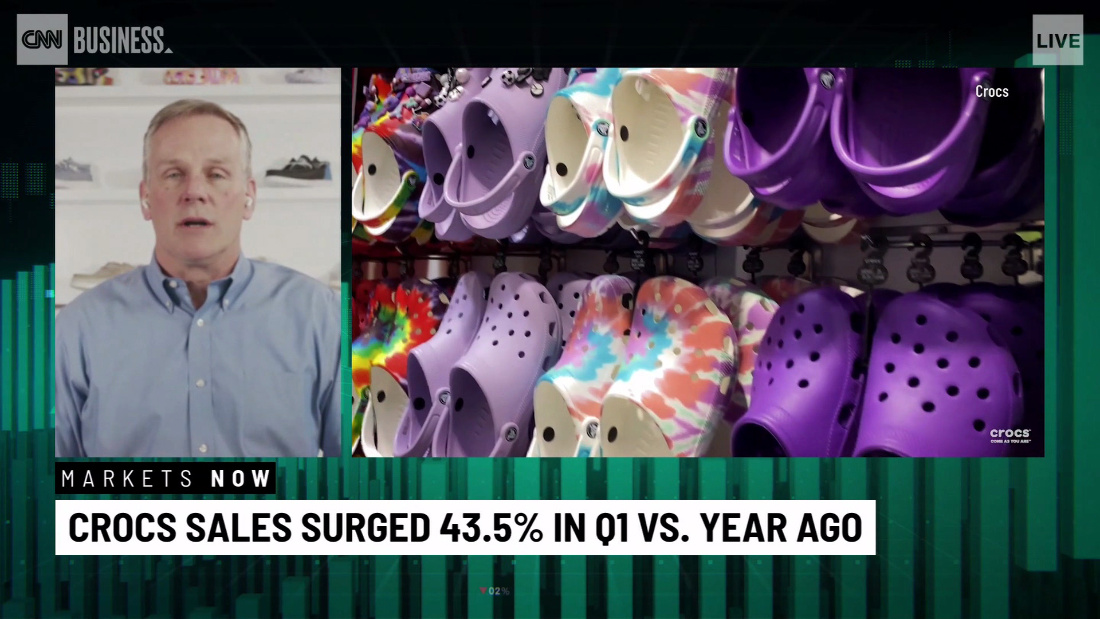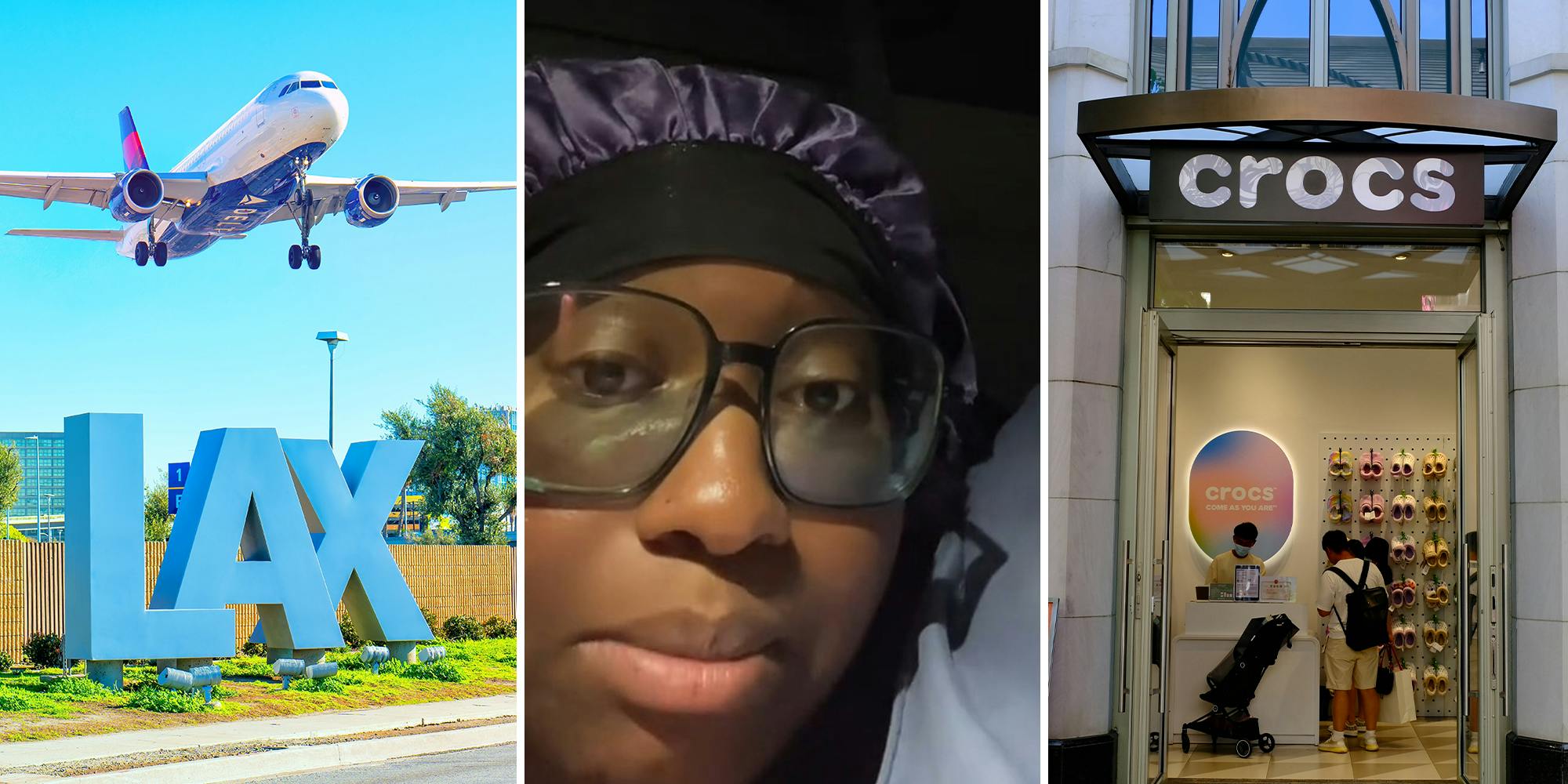Has the simple comfort of a casual shoe become the focal point of a societal reckoning? Recent allegations swirling around Crocs CEO Andrew Rees have sparked outrage and calls for boycotts, potentially threatening the brand's carefully cultivated image and years of financial recovery.
The internet, a relentless judge and jury in the digital age, is currently consumed by a viral video rumor. This rumor alleges that Andrew Rees, the CEO of the ubiquitous footwear company Crocs, was caught on camera at Los Angeles International Airport (LAX) using a racial slur. The purported incident has quickly ignited a firestorm of controversy, igniting debates about the ethics of consumerism and the responsibilities of corporate leadership.
Social media platforms have become battlegrounds, with users furiously debating the veracity of the video and the appropriate response. Many are urging a complete boycott of Crocs, while others are calling for a more measured approach, demanding verification of the allegations before taking action. The impact of such a boycott, if sustained, could be significant, considering Crocs' recent financial successes.
- Dafne Keen Exploring Claims Reality Google News
- Alyssa Edwards The Drag Superstar Her Husband A Deep Dive
The allegations themselves are centered on a specific event that purportedly unfolded at LAX. While details remain unconfirmed and the video itself has yet to be widely disseminated, the mere suggestion of a racially charged incident involving the head of a major corporation has been enough to trigger a widespread reaction. This incident, if proven true, would stand in stark contrast to the brand's marketing, which often emphasizes inclusivity and comfort, and may deal a massive blow to the company's image.
The accusations have resonated deeply, especially within communities already impacted by systemic inequalities. The potential implications reach beyond the realm of footwear, prompting conversations about corporate accountability and the need for companies to uphold values of diversity and inclusion, not just in their marketing, but also in the actions of their leadership.
The fallout from the allegations also extends to the company's employees and stakeholders. The Crocs distribution center in Dayton, Ohio, has seen the impact first hand, as employees are feeling the uncertainty that comes along with such allegations. The sentiment among some is that Crocs does not care about minorities, an opinion that, if widely held, could devastate the brands reputation and customer base.
- Espns Get Up 2024 What You Need To Know Where To Watch
- Jayson Tatum Nationality Ethnicity More Unveiled
The unfolding situation provides a stark illustration of the power of social media to both amplify and potentially distort information. The speed with which the rumor has spread, the intensity of the reactions, and the potential for real-world consequences all highlight the complex challenges facing brands in the digital age.
The incident also serves as a reminder that even the most successful companies are not immune to crises. Crocs, after years of losses, had recently achieved significant financial milestones. The company reported net income of over $119 million last year, and its shares have jumped significantly in value. However, a single allegation of misconduct can quickly unravel years of positive progress, showcasing the fragile nature of a brand's reputation.
The claims against Rees, which, if true, would constitute abhorrent behavior, are especially damaging given the contemporary social and political climate. Public outrage over racial injustice is at a fever pitch, making any perceived instance of racism particularly inflammatory. Similar instances involving other high-profile figures, such as former Los Angeles Clippers owner Donald Sterling and former CrossFit CEO Greg Glassman, have demonstrated the potential for such controversies to inflict lasting damage to reputations and businesses.
In a case unrelated to Crocs, leaked audio recordings of racist remarks made by Los Angeles City Councilwoman Nury Martinez served as a shock to the L.A. political establishment, highlighting the sensitivity surrounding racial issues in the public sphere. This heightened sensitivity has only intensified the reaction to the Crocs allegations.
The incident at Nick's Original Filet House in Tuscaloosa provides another parallel. After a video of the owner making a racist comment went viral, the restaurant found itself under social media siege, a potent demonstration of the power of public sentiment to inflict economic harm.
As the story continues to evolve, the public will be watching closely, and the consequences for Crocs and its CEO could be profound. The company has yet to issue an official statement addressing the allegations, leaving a void that social media users are eagerly filling with speculation, outrage, and calls for accountability.
| Category | Details |
|---|---|
| Full Name | Andrew Rees |
| Date of Birth | Information Not Publicly Available |
| Nationality | Information Not Publicly Available |
| Current Position | Chief Executive Officer (CEO) of Crocs, Inc. |
| Education | Information Not Publicly Available |
| Career Highlights |
|
| Controversies |
|
| Reference | Crocs Investor Relations |
The incident has been amplified by social media, with users sharing TikTok videos with hashtags like #crocs, #crocsgang, and #ownerofcrocs, reflecting both support for the brand and expressions of outrage. The juxtaposition of these reactions demonstrates the complex and often contradictory ways consumers relate to corporations and their leaders.
The controversy also touches on the emotional connection consumers have with brands. Take, for instance, Anjali Khosla, who has worn Crocs for years, favoring the brands designs. The fact that she, and others like her, are now forced to reconsider their relationship with the brand is indicative of the profound impact of such allegations.
The incident serves as a reminder of the power of perception, especially in a world saturated with information. The initial rumor, which started with an alleged video, has already set off a chain reaction. Even if the video is proven to be a fabrication, the damage to the brand's reputation may already be done, highlighting the challenges of managing a public image in the digital age.
The allegations against Rees are not the first time a corporate leader has been accused of making racist remarks. The resignation of Greg Glassman from Crossfit, following comments about the Black Lives Matter movement, serves as a parallel case. Glassman's remarks in a private Zoom call reflected resistance to the expectation that he should mourn George Floyd's death, a stance that drew sharp criticism and ultimately led to his departure.
The contrast between Crocs purported image and the actions of its CEO is stark. The company's marketing often emphasizes inclusivity and comfort, but the allegations against Rees directly challenge this image. The company's success in recent years, including net income of more than $119 million and a 70% jump in shares, could be jeopardized. This makes the situation not only a matter of ethics, but also a potential threat to the company's financial future.
The situation underscores a critical point: a company's values and the actions of its leadership must be aligned. Consumers increasingly demand transparency and accountability from the brands they support, and any perceived deviation from these standards can have a devastating impact on a company's reputation.
The public's response to the alleged incident reflects a broader trend of holding corporations accountable for the behavior of their leaders. The willingness of consumers to boycott a brand over such allegations signals a shift in power dynamics, with consumers demanding that companies take a stand against racism and discrimination. This new power dynamic forces brands to act responsibly.
The situation also reveals the power of social media to both spread information and shape public opinion. The speed with which the rumor spread, the intensity of the reactions, and the potential for real-world consequences all underscore the complex challenges that brands face in the digital age. Every tweet, post, and comment contributes to the ongoing narrative, and the ultimate resolution of the situation will likely depend on how the key players respond.
The incident serves as a cautionary tale, highlighting the importance of corporate responsibility and the fragility of brand reputation in the face of allegations of racism. As the story unfolds, the public will be watching closely, and the consequences for Crocs and its CEO could be significant.



Detail Author:
- Name : Prof. Devyn Lynch
- Username : bbednar
- Email : jamaal.muller@ebert.com
- Birthdate : 1998-01-09
- Address : 182 Sherman Pass Bruceton, VA 96194-8033
- Phone : 1-937-337-8474
- Company : Pfannerstill PLC
- Job : Urban Planner
- Bio : Quas voluptatem sit dolorum magni. Eos officia labore id nihil quo voluptatibus. Enim enim quaerat et praesentium rem aut debitis delectus.
Socials
twitter:
- url : https://twitter.com/coleman_lang
- username : coleman_lang
- bio : Ducimus minus unde doloribus voluptatem dolores consequatur. Repellat quidem omnis quidem velit. Qui autem omnis dolorem sunt repellat.
- followers : 2642
- following : 919
linkedin:
- url : https://linkedin.com/in/coleman_lang
- username : coleman_lang
- bio : Dolor vel in voluptatem iste quam sequi.
- followers : 5176
- following : 45
tiktok:
- url : https://tiktok.com/@coleman_lang
- username : coleman_lang
- bio : Similique earum et dolore dicta vero. Aut sunt sint mollitia amet dolor.
- followers : 5752
- following : 1936
facebook:
- url : https://facebook.com/lang1984
- username : lang1984
- bio : Harum commodi dolorem vel illo soluta quod cupiditate.
- followers : 3668
- following : 143
instagram:
- url : https://instagram.com/colemanlang
- username : colemanlang
- bio : Est illo ipsa rerum nemo id. Nam et consectetur id sed.
- followers : 3152
- following : 1270
